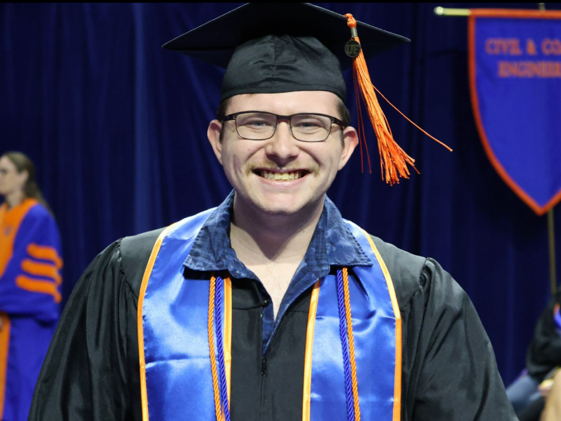Licensed to lead, UF students join elite ranks as nuclear reactor operators
As a first-generation college student from rural Alachua, Florida, Alex Trimble never imagined he would one day operate a nuclear reactor.
But in 2025, after years of determination, he earned his reactor operator license through the University of Florida’s training reactor (UFTR) program, joining a small, elite group of students trained to safely control one of the few university reactors in the country.
Built in 1959 and operating out of the Nuclear Engineering program in the Herbert Wertheim College of Engineering, the UFTR is one of fewer than 30 reactors still operating in the United States. The college uses the reactor to train students like Trimble in nuclear science and reactor operations, and in lab courses in nuclear engineering, physics, chemistry, geology and environmental engineering.


-fotor-20251022143825.jpg)
Trimble, along with fellow UF students Claudia Tariche Fortes and Caitlin Martin, earned his license through the U.S. Nuclear Regulatory Commission licensing program, which requires months of intensive study, hands-on training and rigorous written and operational exams, including mastery of nuclear systems and safety protocols.
“Reflecting on my time at the UFTR, I am constantly reminded of the profound legacy we carry forward,” Trimble said. “As engineers and scientists, we build upon the foundational work of those who came before us, standing on the pillars of giants. Each startup, whether for training, experiments or other purposes, filled me with a sense of awe and purpose.”
Fortes agreed.
“Working at the reactor was a unique and rewarding experience,” Tariche Fortes said. “I felt a sense of pride in being trusted to help run and maintain this long-standing facility. It was also pretty cool working with an older control room that looked like something out of a 1960s sci-fi movie.”
Martin said the experience felt like being part of a “living legacy.”
“Seeing old black-and-white photographs of students and faculty from decades past, all doing the very same things I was doing, was a powerful reminder of the reactor’s core mission: teach and train,” Martin said.
UFTR Director Donald Wall, Ph.D., emphasized the program as a serious time commitment, with dedication and reliability as core values integral to student success.
“We start from zero,” Wall said. “We teach students everything they need to know – how reactors work, the math, the safety procedures and how to operate one. Once they have that foundation, they begin hands-on training.”
Students are required to learn every component of the reactor, from engineering and construction to emergency procedures, instrumentation and radiation safety.
“I spent vacations and holidays with technical specs and system diagrams on my lap, literally tanning while memorizing the layout of pumps, piping, control rods and safety interlocks, because confidence at the controls comes from knowing the system down to muscle memory,” Martin said.
The Nuclear Regulatory Commission provides the program’s exams and oversight at no cost due to the growing demand for skilled workers in manufacturing, construction and nuclear reactor operations.
“The training is more intensive than most academic coursework,” said Wall, who recently earned a senior reactor operator license. “You must be dedicated for a long time. These students stick with it. They’re trustworthy, capable and they show real character.”
For Martin, bridging the gap between equations on paper and physics in action motivated her.
“What truly inspired me was the chance to move from abstract theory to direct practice,” Martin said. “The idea of physically controlling a critical system, of being the one to bring a reactor to power, carried a sense of awe and tangible responsibility that no lecture could ever capture.”
Interest in nuclear systems is on the rise among students nationwide, and UF is no exception. In Fall 2025, undergraduate enrollment in nuclear engineering reached 114 students, the highest in a decade. While this reflects growing enthusiasm in the field, the program remains open to students from all academic majors.
“This is a rare experience you won't find at most other colleges in the world,” Martin said.
But, added Tariche Fortes, UFTR students need to put in the work for the reward.
“In the end,” she said, “you’ll be able to say that you are a reactor operator.”
